The series of Thin Man movies answers the question, “What does happily ever after look like?”
Easy Living (1937): Everybody fall down
When a an expensive fur coat falls on her head, Mary Smith’s life of scraping together enough for food and rent turns upside down. She suddenly finds herself in a world of wealth, as she’s mistakenly perceived of as the mistress of Wall Street banker and tycoon, J.B. Ball.
Easy living was never so hard — or muddled and funny.
Characters in close quarters – Crimson Tide
You wouldn’t immediately associate submarine movies with a film like Key Largo but they have something in common. The dramatic tension comes about by having characters constrained within close quarters. In Key Largo, it’s within a hotel because of a hurricane; in submarine movies it’s due to the nature of submarines.
I don’t like a phrase like “submarine movies” but there is no getting around the fact there is a kind of sub-category of action-adventure films characterized by where they are set — on submarines. They’re often among the best of the action-adventure variety of films because of the close quarters that seem to force filmmakers to concentrate on characters.
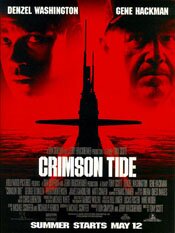 Crimson Tide (1995)
Crimson Tide (1995)
Directed by Tony Scott
In the tradition of movies like Run Silent, Run Deep, The Hunt for Red October and Das Boot, the Tony Scott directed Crimson Tide is submarine drama with strong lead characters. If it distinguishes itself from those previous movies it is by being faster moving and much noisier.
That may not sound overly appealing but it be would wrong to think that way. This is a very good, very engaging action-adventure with a strong foundation: the performances of Denzel Washington and Gene Hackman.
It’s also supported by strong performances by its supporting cast – Matt Craven, George Dzundza, Viggo Mortensen and James Gandolfini, to name a few.
Without its strong cast, I think this would likely be just an average film but with them it is firmly anchored.
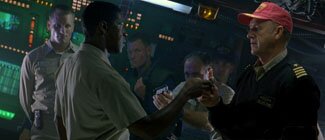
There is a state civil war in Russia. Rebel generals have taken over a base with nuclear weapons and it appears as if they may use them. The U.S. naval sub Alabama, nuclear-armed, is sent to Asian waters to await instructions. They get them: prepare your missiles. A further message, only partially received, may be orders to fire them or to stand down. It is unclear.
The movie’s conflict is between the sub’s captain (Gene Hackman) and its new executive officer (Denzel Washington). For the missiles to be fired, the two must be in agreement. They aren’t. The captain wants to fire; his second in command does not.

What makes movies like this dramatic and appealing (and you see this in films like Run Silent and Red October) is that the “bad guy” is external – off set. The leads, in this case Hackman and Washington, are both good guys but they are at opposing ends about what to do and thus in conflict.
This increases the film’s conflict by removing the easy, black and white choice and while an audiences’ sympathy may align with one, they can’t easily dismiss the other.
This is also reflected in the unfolding of the film’s drama where the sub’s crew must choose sides, many of whom are conflicted (like Mortensen’s Lt. Ince). We end up with struggles in the submarine, including mutiny, because of the lack of clarity. It’s all due to the ambiguity of the last orders received.
The movie doesn’t ease its audience into the story; it throws them in head first. Music and editing thrum as it begins with a journalist describing events in Russia. There is no slow unfolding of exposition. Director Scott and producer Jerry Bruckheimer take the approach of throwing the audience in at full speed. Details fly by like rapid fire flash cards.
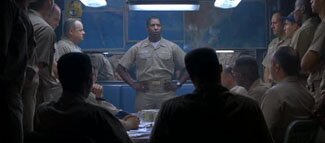
In some movies, this is noise and fury approach can be a gimmick to mask an uninspired story but in Crimson Tide it’s a quick and effective way to get quickly to what is an intelligent, well told story. Perhaps its due to the close quarters of submarines, but movies like this seem to lend themselves to dramatic, character-driven films.
While my own preference is for the quieter tension of a movie like The Hunt for Red October (which I find more effective), it works for Crimson Tide as it delivers a compelling film that leaves an audience with something to question and discuss when is over.
On the whole, this is a very good movie and well worth seeing and more than once.
John Ford, John Wayne and Expendable
Sometimes the release dates of movies can be significant. Get it wrong and you’re all in a muddle, as I was when I watched They Were Expendable.
The movie itself isn’t anything I would say you should rush out to see unless you’re a really big John Ford and/or John Wayne fan. The tone of it is curious, however, given the kind of movie it is and what it is about. Some movies are intriguing despite not being great films and that is the case with this one.
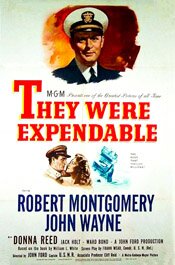 They Were Expendable (1945)
They Were Expendable (1945)
Directed by John Ford
I was very confused when I watched the war movie They Were Expendable because I thought it was from 1941. It turns out that is when the movie is set as it opens. My confusion evaporated, however, when I realized it was from 1945, though it is still an unusual movie that John Ford gives us.
Believe me, with this movie the year really matters – especially if you confuse it with four years earlier.
This movie was released in December of 1945. In World War II, Japan formally surrendered in September of 1945.
The movie is somber recounting of the early days of the war for the U.S., beginning with the attack on Pearl Harbor in December of 1941.
Made with the approval and assistance of the U.S. Navy, Army and Coast Guard, it shows us the U.S. getting its behind kicked by the Japanese – starting in Pearl Harbor and continuing through the Philippines.
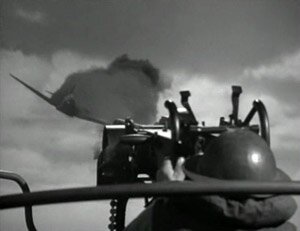
Audiences at the time of the film’s release, however, would be fully and completely aware of the end result of it all – victory in the Pacific; Japan’s surrender.
The reason John Ford shows us all the bad news from the war’s early days is because he’s telling the story of the PT boats – how their role in the war came about (they weren’t highly regarded originally), how they won respect and the sacrifices made by the crews that worked them. (The tagline was, “A tribute to those who did so much… with so little!”) However, the main character is really the boat itself.
The movie is a solemn tribute and sober homage but also full of patriotism which, appropriate to the period of its release, may strike a current day viewer as a bit much.
There are good action scenes in the movie as well as some interesting, almost noir-ish lighting in others. The movie itself appears to be in poor shape, at least on the DVD copy I have. I don’t know if any restorative work went into it but it doesn’t appear so given the scratches in a number of scenes. I’m a bit surprised it comes to use from Warner Brothers. It may have something to do with the lack of good original film materials. I don’t know.
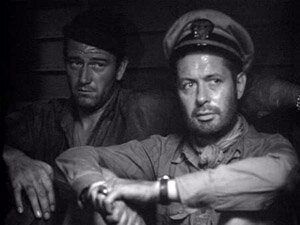
Overall, I can’t say this is a great movie. It’s a curious one, however. It’s worth seeing at least once, especially if you’re a fan of either John Ford or John Wayne. Just keep in mind this movie should probably be viewed as a propaganda work.
And maybe that is what makes it peculiar. It’s quite a bit of “Rah, rah!” about PT boats but seems to also want to be a solid drama and thus it acquires a bipolar quality.
20 Movies: The Truman Show (1998)
 An innocent abroad in a less-than-innocent world is a standard story template. It has been used over and over. Decades ago I read Robert Heinlein’s A Stranger in a Strange Land. That was one take on the innocent story. Kurt Vonnegut’s Slaughterhouse-Five, with his main character of Billy Pilgrim, was another.
An innocent abroad in a less-than-innocent world is a standard story template. It has been used over and over. Decades ago I read Robert Heinlein’s A Stranger in a Strange Land. That was one take on the innocent story. Kurt Vonnegut’s Slaughterhouse-Five, with his main character of Billy Pilgrim, was another.
It shows up in movies frequently as well, such as The Truman Show. When it is used, it is often with a satirical purpose. Through the innocent’s eyes, we see how the world really is (or how the author or filmmaker thinks it really is). It’s usually comic, at least to some degree.
But the satire isn’t just intended to illustrate what is wrong with the world. It is also to illustrate what could be right and how we’ve gone off track from pursuing it.
That is really what is at the heart of The Truman Show. It isn’t about the misguided nature of television and its audiences, though it is that in part. And it’s not simply about the hazards of over-the-top commercialism, though it’s about that too.
The story of the innocent is really about what the point of our lives is and what we could be doing with them.
Truman’s story is about a man who wants more. Not more “stuff,” but more meaning. Yes, his life is comfortable. But for Truman, that’s not enough. He wants to know, “What else is out there?”
The Truman Show (1998)
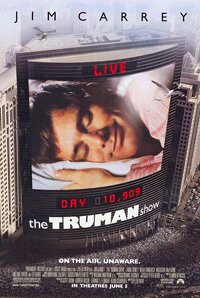 directed by Peter Weir
directed by Peter Weir
“You never had a camera in my head.”
Those words, I think, capture the essence of The Truman Show best. There’s much in the world that can be controlled, but controlling what someone thinks and, maybe more importantly, feels is not so easy.
For me, this is one of the best movies of the 1990’s, and one of my favourite movies, period. Now, with the recent release of it in a special edition, I have the DVD I had been wanting – better image, informative features. (Note: this review was written in 2005 and refers to the Special Collector’s Edition DVD.)
Slightly preceding the current glut of reality TV shows, the film’s concept seems simple enough, though perhaps less clever now than when it first appeared, before our reality TV world.
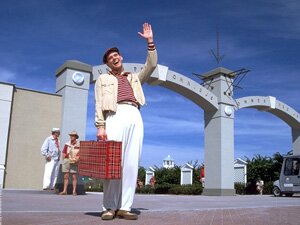 While the concept may seem simple – a movie about a guy whose entire life is broadcast live on television – imagine how you would execute that and make it interesting. It comes across more like a clever notion on paper, but the kind of thing that could lead you into a cinematic fiasco.
While the concept may seem simple – a movie about a guy whose entire life is broadcast live on television – imagine how you would execute that and make it interesting. It comes across more like a clever notion on paper, but the kind of thing that could lead you into a cinematic fiasco.
But between Andrew Niccols’ script, Peter Weir’s direction and some great casting, it works brilliantly.
Jim Carrey is Truman Burbank. His life , from birth, has been broadcast live to the world (unbeknownst to him). He lives in a town called Seahaven – always has, he’s never left – but what he doesn’t know is Seahaven is a television set in California, not a town on the Florida coast. He lives in a not-quite-perfectly controlled world.
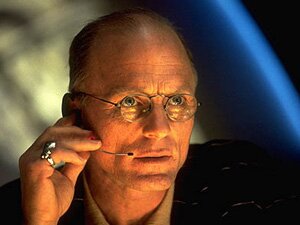 “We accept the reality of the world with which we are presented,” says Christoff (Ed Harris), the show’s creator and mastermind.
“We accept the reality of the world with which we are presented,” says Christoff (Ed Harris), the show’s creator and mastermind.
But as much as Christoff controls Truman’s world, he can’t control everything – including Truman.
There are small errors in Truman’s world and they might go unnoticed by him except the life scripted for him is not the one he would live. The more the show’s creator, actors and crew try to steer Truman and keep him on script, the more he resists.
And so Truman embarks on discovering his world, though that’s not his initial motivation.
As mentioned in the special features, Peter Weir made one change to the script that was bang on the money. Originally set in New York, and a darker film, Weir understood that for people to watch such a show (not the movie, but in the script’s world, The Truman Show), it would need to be lighter, more comforting.
So the movie is set in Seahaven, a somewhat heightened reality. It’s roots are more in the world of 1950’s television than the real world, though not to such an extent that it lacks credibility.
Another great notion in the film’s making was the casting of Carrey. He is perfect as Truman. Charismatic and affable, he brings the right amount of innocence to the role of Truman. It might not have worked in another movie, but in the world of The Truman Show it hits the mark.
I also like that there are several ways of seeing The Truman Show. There is the obvious satire on television culture and the issue of personal freedom.
(I like the irony of Christoff “a very private man” being the architect of a very public life – Truman’s.)
Another way of seeing the film, however, is as a fable of a child leaving home.
Christoff is an obvious father figure and Truman is clearly a young man trying his damnedest to leave and find his own life – but not the one Christoff dreams for him (rather like a parent trying to impose his vision on his child.)
 In fact, however you view the film, it’s essentially a fable. Perhaps this is why I like the movie so much – I’ve a weakness for these types of films when they are well done.
In fact, however you view the film, it’s essentially a fable. Perhaps this is why I like the movie so much – I’ve a weakness for these types of films when they are well done.
Weakness or not, I consider this one of the best films of the last decade or so. It’s also one I think will continue to be watched over the years as it captures, quite succinctly and in an engaging fashion, something in the nature of freedom that is deeply woven into the human fabric. The film’s ending captures an archetypal, mythic moment and it’s one that resonates. I can’t recommend this one highly enough.
The Truman Show (the trailer)
Links:
- The Truman Show – DVD, HD, etc. on Amazon.com (U.S.)
- The Truman Show – DVD, HD, etc. on Amazon.ca (Canada)


